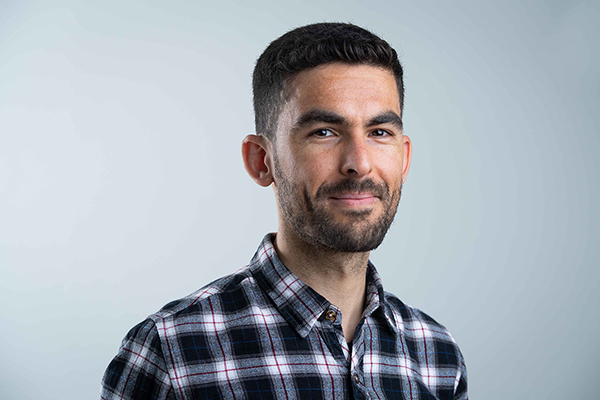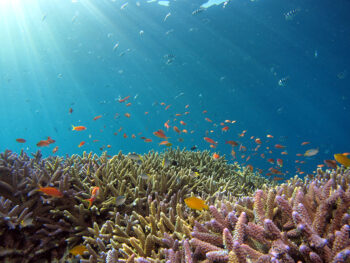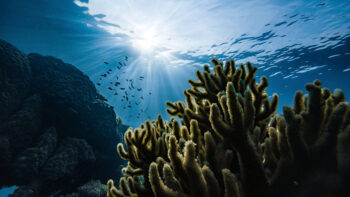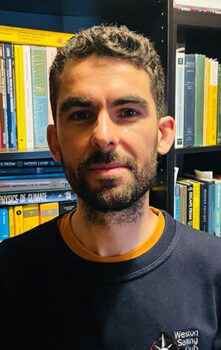Francisco de Melo Viríssimo

Francisco is a mathematician and environmental scientist, with a primary interest in climate and ocean phenomena.
Francisco joined GRI in November 2021. Since then, much of his work has been focused on climate prediction, particularly on computational ensemble design and uncertainty quantification, as tools to provide robust and reliable knowledge to climate information users and consumers (such as economists, decision makers and journalists).
At GRI, Francisco co-leads the £1.97m UKRI/Defra-funded ATTENUATE project, a collaborative consortium focused on unlocking private sector investment in UK climate adaptation. Central to this project is the creation of mathematically/physically robust climate storylines, which communicate evolving climate information and will play a key role in testing adaptation finance solutions.
Other current projects and roles include:
- Project Member, JETZON Ocean BCP Benchmark, Working Group 1;
- Chair, IMA Special Interest Group on “Climate, Environment and Sustainability”;
- Associate Member, Parliamentary & Scientific Committee;
- Lead editor, cross-journal EGU special issue on “Theoretical and computational aspects of ensemble design, implementation, and interpretation in climate science”;
- Co-editor, J. Phys. focus issue on “Mathematics of Planet Earth: Theory, Data, and Models”;
- Editor, JETZON Newsletter.
Background
Francisco graduated with a BSc in Pure Mathematics and an MSc in Applied Mathematics, both from the University of Sao Paulo (USP), and with a PhD in Mathematics from the University of Bath. Following his PhD, Francisco spent the first few years of his postdoctoral career working as a Research Scientist for the UK’s National Oceanography Centre(NOC), before joining GRI in 2021. Francisco is also a Visiting Fellow at the Interdisciplinary Climate Investigation Centre(INCLINE) at USP, and has previously been a visitor at the NOC, the Isaac Newton Institute (INI), and the Federal University of Parana (UFPR) in southern Brazil.
His research experience spans areas such as applied dynamical systems, computational mathematics, climate dynamics, marine biogeochemical cycles and fluid mechanics.
The quality of his research has been recognised by several awards over the years, including a prestigious STEM for BRITAIN Award in the Houses of Parliament in 2024 for “quality of mathematical work” on climate prediction.
In addition to his scientific work, Francisco has a broad experience of service to community in his areas of expertise and in different roles. In particular, he has served as Councillor and Trustee for the Institute of Mathematics and its Applications (IMA), which is the professional and learned society for Mathematics in the UK.
Research interests
- Modelling of ocean and climate phenomena: from conceptual modelling (e.g. Stud. Appl. Math., 2019) to state-of-the-art global models (e.g. Proc. Natl. Acad. Sci. USA, 2022);
- Theoretical foundations of climate prediction and uncertainty quantification (e.g. EGU, 2023, Bull. Am. Meteorol. Soc., 2025);
- Marine biogeochemistry and the ocean’s carbon cycle (e.g. Global Biogeochem. Cy., 2022, Geophys. Res. Lett., 2024);
- Differential equations, nonlinear dynamics and chaos (e.g. Proc. Royal Soc. A, 2020, Chaos AIP, 2024)
- Knowledge exchange in Earth and Environmental Sciences (e.g. Math. Today, 2022).
Research
Research - 2026
In this opinion article for the British Medical Journal Francisco de Melo Viríssimo argues that forest-like governance, financing, and enforcement to ensure the future of our oceans. Read more

Research - 2025
The authors of this paper use a low-dimensional system with key characteristics of a climate model, they examine two types of parametric uncertainty through a large ensemble approach. Read more

This paper introduces Low-EFFourth (LEF4), a MATLAB-based computational framework designed for generating and studying multilevel model ensembles in continuous dynamical... Read more

Utilising a low-dimensional system with key characteristics of a climate model, the authors of this paper examine two types of parametric uncertainty through a large ensemble approach. Read more

Research - 2024
The authors of this paper report on an event where a broad and diverse group of marine biogeochemists were invited to construct flowcharts to support making the decision of when to include a new process in a model. Read more

Research - 2023
In this article, we approach the problem of measuring and interpreting the mid-term climate of a non-autonomous chaotic dynamical system... Read more

The authors of this paper use a global ocean-biogeochemical model to show that seasonal variability in a spatially uniform flux attenuation can lead to spatial variability emerging in annual mean transfer efficiency that matches observations of being higher at high latitudes than in low latitudes Read more

Research - 2022
This article reports on a mini-symposium ‘Mathematical and Computational Perspectives in Marine Biogeochemistry and the Ocean’s Carbon Cycle’ on 15... Read more

The authors of this paper demonstrate that organic carbon fluxes at 1,000 m are a good predictor of long-term carbon sequestration and suggest this is an important metric of the BCP that should be prioritized in future model studies. Read more

The Bristol CMIP6 Data Hackathon formed part of the Met Office Climate Data Challenge Hackathon series during 2021, bringing together... Read more

The biological carbon pump is a key component of the marine carbon cycle. This surface-to-deep flux of carbon is usually... Read more

Events
News
News - 2025
Organised by the European Geosciences Union (EGU), the Arne Richter Award honours those who have made important contributions to the Earth, planetary and space sciences. Read more

This article reports on the Institute of Mathematics & its Applications inaugural meeting on Mathematics for Climate, Environment and Sustainability which brought together over 70 participants from across academia, industry, policy, and the early-career community. Read more

This news article by the Institute of Mathematics & its Applications (IMA) announces the launch of its first Special Interest Group (SIG) on Climate, Environment and Sustainability (CES). Read more

News - 2024
In this episode of Living Proof, Dan Aspel is joined by Francisco de Melo Virissimo, one of the three medal winners at the 2024 STEM for Britain awards held at the UK parliament in Mar Read more

In this LSE Q&A article Francisco de Melo Virissimo discusses his work at the Grantham Research Institute and the important... Read more

This article reports on the Mathematical Sciences Awards at STEM for Britain. Read more

This article reports on the winners of the Gold, Silver and Bronze medals for mathematics in the 2024 STEM for... Read more

This article considers how novel dynamical systems approach may lead to better forecasting using less computational power. The article references... Read more

News - 2022
In this commentary article Francisco de Melo Viríssimo explores how mathematics contributes to marine biogeochemistry modeling. Read more

This article reports on new research which uncovers how seasonal changes affect the amount and rate of carbon as it... Read more


